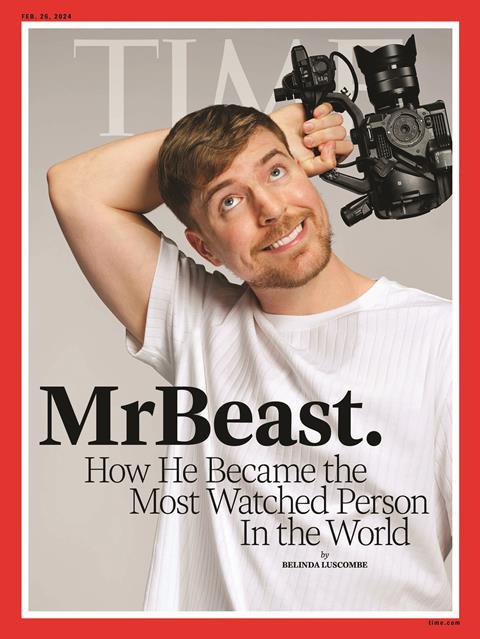The world’s biggest YouTuber has more than a quarter of a billion followers and is one of the most influential people on earth. Should Christians be thrilled that he’s putting radical generosity in the spotlight? It’s complicated…
An elderly man has fallen into financial difficulty and is about to be made homeless. A family friend contacts another man – an influential internet star with a penchant for public shows of generosity. In apparently no time at all, a film crew are documenting what happens when this influencer offers his assistance…and hands the pensioner keys to a brand-new apartment. No strings are attached, apart from consenting to allow the story to play out on millions of screens around the world, along with the click-attracting title: I Gave A Homeless Man A Home.
This short modern parable is the basis of a viral video created by global youth culture’s most famous philanthropist: Mr Beast. It’s one of scores of similar videos, spread across the star’s multiple YouTube channels, which centre on the distribution of wealth, gifts and charity, either to deserving or lucky winners.
Mr Beast, whose real name is Jimmy Donaldson, has carved out a niche making films such as 1,000 Blind People See For The First Time, I Built 100 Wells in Africa, and I Saved 100 Dogs From Dying. The basic plot of every one is as it sounds: Donaldson identifies a worthy cause, and throws an extraordinary, life-changing amount of money at it while his millions of subscribers look on. On the surface at least, it’s a rare example of a cultural icon using their fame and resources for good and, in a cynical world, it’s gained Donaldson almost universal acclaim.

Unleashing the Beast
Donaldson – still only 26 at time of writing – launched his online career aged just 13, while still a pupil at Greenville Christian Academy in North Carolina. Initially, he posted YouTube videos based around console games such as Minecraft and Call of Duty, under the moniker ‘MrBeast6000’. His early efforts were relatively unpopular, but he began to grow a following as he branched out into more generalised content. At 18, he started filming himself attempting entertaining challenges. Then, a video in which he counted from one to 100,000 became an unlikely viral hit. Around that time, Donaldson began to incorporate philanthropy into his videos, gaining him an almost instant reputation for generosity and kindness.
This change of focus may not have been entirely altruistic, however. Donaldson recalls that this fledgling period, during which many of his contemporaries were pursuing education, was spent on an obsessive quest to make sense of how to go viral. “There’s a five-year point in my life where I was just relentlessly, unhealthily obsessed with studying virality, studying the YouTube algorithm,” he told Bloomberg News. The discoveries he made during that period form the basis of what has now become a well-known and often-imitated approach. Cartoonish thumbnails – the tiny pictures which invite a user to click on a new video – always feature Donaldson’s grinning or gurning face, treated with a hyper-real filter. A one-line title promises a rewarding viewing experience which will connect with both head and heart. And, more often than not, the subject of the video appears to involve the outrageous generosity of our big-hearted hero.
Mr Beast has an almost unparalleled global influence, especially among younger generations
The results have been mind-boggling. To date, Mr Beast videos have amassed an almost incomprehensible 68 billion views. In 2023, Time magazine named him one of the world’s 100 most influential people. But Donaldson’s USP – giving away gifts and money – has brought extraordinary rewards for him too.
One of these is the almost universal praise that his radical generosity has earned him. In a recent TED Talk based around his new book Infectious Generosity (WH Allen), TED conference pioneer Chris Anderson describes Donaldson as: “someone who wants to share the amazingness of life, and with these kind of crazily audacious stunts…he is introducing a whole new generation to the possibility that generosity is actually really cool. It’s a beautiful thing.”
So, while Donaldson is the recipient of some of the more familiar benefits of fame, including wealth and recognition, he’s also getting something more elusive among celebrities: respect. The latest YouGov appraisal of public opinion gives him a 37 per cent ‘popularity’ rating (meaning this percentage of the population feel positively about him), and only a nine per cent ‘disliked by’ rating. He is particularly popular among younger people, the same group who have most notably lost faith in political leaders and other more traditional global figures such as heads of religion. For them, Donaldson is not only an icon but a role model; a purveyor of the sorts of virtue to which they aspire.
Of course, generosity is a virtue – one that plays an important role in the Christian life. “God loves a cheerful giver”, Paul writes in 2 Corinthians 9:7, continuing the consistent thread that can be traced back to Deuteronomy 15:7-8 and the command: “If anyone is poor…do not be hard-hearted or tight-fisted towards them. Rather, be open-handed.” So, should we be thrilled that Donaldson, despite publicly shedding his inherited Christian faith in 2022, is bringing a countercultural kingdom value into the mainstream?
Trumpets
In his famous mountainside sermon in Matthew’s Gospel, Jesus addresses a very human temptation. Part of the reason that generosity feels good is that when people recognise it, they praise us. We’ve all experienced the thrill of giving a gift and being thanked – perhaps even embraced – for our thoughtful kindness. This is the reward of generosity, and it forms at least part of our motivation for giving the gift in the first place (that’s why ungrateful people make us feel so cross). Jesus challenges this aspect of our nature, describing the practising of “righteousness in front of others to be seen by them” (Matthew 6:1) as a flaw to be avoided. Do that, he says, and you’ll get your human reward, but miss out on a supernatural one.
True generosity is not earned, and does not need to be repaid, whether with a word of thanks or a million views on YouTube
Jesus also takes aim at the sorts of people he observes at the temple, contrasting them with the widow making her quiet offering: “When you give to the needy, do not announce it with trumpets, as the hypocrites do in the synagogues and on the streets, to be honoured by others” (Matthew 6:2). Instead, he urges giving in secret. Part of what makes generosity so powerful – and so divine – is that it’s about the receiver, not the giver. It’s a picture, albeit an incomplete one, of God’s grace: true generosity is not earned, and does not need to be repaid in any way, whether that’s with a word of thanks or a million views on YouTube.
What Donaldson does is utilise the virtue of generosity, not only to create a positive public image for himself but also to drive traffic. Like so much of what comes out of (or via) Silicon Valley, the Mr Beast videos hack what might cynically be regarded as a vulnerability in human psychology: we love to see generosity in action; we enjoy praising the generous person. Jesus knows better, however, telling his followers to do their philanthropy so secretly that the left hand doesn’t even know what the right is doing (Matthew 6:3). TED’s Anderson would argue that public displays of generosity become infectious and inspire us to go and do likewise. Jesus warns that instead, this kind of giving becomes all about the giver.
Philanthro-tainment
It’s a mistake to caricature Mr Beast as being solely philanthropic. His channels also include videos and stunts which have nothing to do with charity or giving money or high-value items away. He has variously buried himself alive, stranded himself in a variety of awkward places, explored super-high-end yachts and even rebuilt Willy Wonka’s chocolate factory. Yet between his philanthropic videos and those designed simply to entertain, a third, blurrier category exists, where Donaldson offers extraordinary financial rewards – apparently drawn from his own wealth – for participation in games and challenges that he devises. And some of them feel inescapably murky.
One of his most recent videos is Ages 1 – 100 Decide Who Wins $250,000. In this high-concept, one-off game show, Donaldson finds 100 people, each one representing a different age, and asks them to decide between themselves who is most deserving of the grand financial prize. It’s a nice idea but, of course, very few people are simply happy to step aside. Before long, the participants are actively encouraged to turn on each other, build alliances and strategise their way to a potential win. In normal competitive circumstances, this would all be fair game, but this is a Mr Beast video: the context is a confusing mix of altruism (Donaldson giving his money away) and cut-throat competition. It’s as if he is trying to set up a real-life Hunger Games for the watching millions to enjoy.
The faith of Mr Beast
Despite being raised by a Christian mother, and having attended a private Christian school, Donaldson – whose videos seldom make reference to any kind of religious faith – no longer identifies as a Christian. In 2022, a Rolling Stone magazine cover story claimed that at the conservative school he attended, Greenville Christian Academy, “boys were given demerits for wearing their hair too long and forced to copy Bible verses as punishment”. He told interviewer EJ Dickson that his faith was rote-learned and religious, recalling: “you have it beat into your head every day” but, having questioned the Church’s stance on homosexuality, Donaldson (who has been accused of homophobia on several occasions) now refers to himself as agnostic. “I believe there is a God,” he told Dickson, “but there are so many different religions and so many people who believe passionately about these things. It’s hard to know which [religion] is right.”
This particular video makes for extremely uncomfortable viewing. As the participants are whittled down, some of the departures feel particularly cruel and jarring. When that happens, Donaldson rewards the person with a spot-prize of a few thousand dollars. It’s a clever attempt to offset any damage to his benevolent public image, but it’s also far too transparent: the clearest example I’ve yet seen of his trumpeted generosity. As the last five contenders plead their case in a kind of ‘balloon debate’, it becomes clear that almost all of them have a fairly pressing financial need, and you can’t help feeling that these people were hand-picked for exactly that reason. The icky feeling persists.
Hope for Mr Beast?
Yet despite these misgivings, the reality is that Donaldson has an almost unparalleled global influence, especially among younger generations. Anderson is right: the Mr Beast phenomenon does help to thrust selfless behaviour, kindness and radical generosity into the spotlight of a generally selfish culture. It’s no bad thing that young people might choose to sit and watch a video called 100 Kids Smile For The First Time instead of immersing themselves in much of the violent and sexualised content that the internet has to offer. Mr Beast offers us lots of opportunities to affirm values like justice, kindness and compassion.
Ultimately, though, that’s not the whole story. Donaldson very deliberately centres his gift-giving world on himself – that’s why so many of his video titles begin with the word “I”, and why the entry point to every single one is dominated by his face. At the same time as teaching a generation to be selfless, he’s demonstrating that success is really found by making it all about you. After five years studying the YouTube algorithm, it turned out the key to virality was found in trying to appear generous while announcing it with trumpets. The secret was in Matthew 6 all along.
Donaldson’s celebrity and influence show no sign of slowing down. A forthcoming television series, currently being produced by Amazon Prime, will likely take his profile to another level and his appeal to a broader age range. Christians should perhaps be encouraged that his kingdom-adjacent worldview is generating such enthusiasm; it suggests that people might be more receptive to the values of Jesus than we imagine. But let’s not pretend that Donaldson is the Messiah. He’s a cheerful giver for sure, but he’s also getting a lot in return.
Online Christian Soldiers

Some of the most high-profile influencers on YouTube profess Christian faith – and some even use their platform to talk about Jesus. Here are a few of the best-known examples…
Dude Perfect
A group of former university roommates who hit the big time with their outlandish ‘trick-shot’ videos (if you’ve never seen one, look them up immediately). Their second video – shot at a Christian summer camp – gained 18 million views and the group sponsored 180 children through Compassion as a result. Frontman Tyler Toney has often talked about his faith in Jesus and the impact this has on his life.
George Janko
A former co-host of controversial YouTuber Logan Paul’s podcast ‘Impaulsive’, Janko not only spoke openly about his faith but reportedly left his lucrative role as Paul’s sidekick because of it. In a 2022 episode, Paul called his friend’s faith “f***ing silly” and claimed that he needed a therapist because: “Jesus isn’t doing it for you.” Janko departed the show shortly afterwards and has since launched his own faith-focused podcast, ‘The George Janko Show’.
Tobi Brown/TBJZL
A member of the British YouTube group The Sidemen, Brown was raised in a strongly Christian British-Nigerian home, and continues to profess a faith in God. Although he’s part of a collective which has often courted criticism for boisterous and perhaps even toxic behaviour, Brown himself is known for being a clean-cut presence on social media.
Sadie Robertson-Huff
A former star of the reality TV show Duck Dynasty, Robertson-Huff is an evangelical Christian who has since appeared in Christian movies such as God’s Not Dead 2, and regularly speaks on the American conference circuit. Her 630,000-follower YouTube channel is faith-based and features interviews with well-known believers and clips of her sermons.






































No comments yet